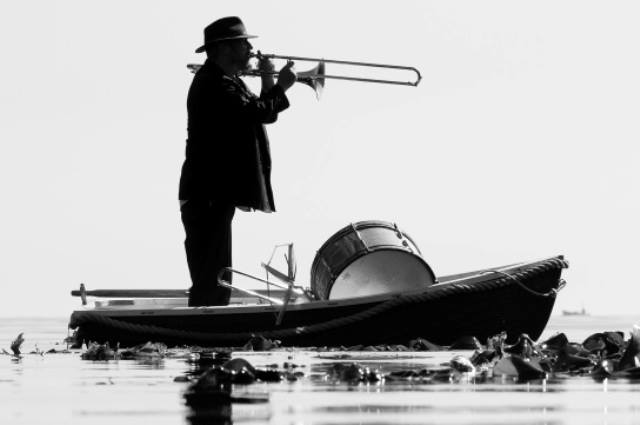
Last year would have been Cornish playwright Nick Darke’s 70th birthday. Sadly, he died in 2005, but his works, particularly his plays produced by Kneehigh Theatre in the 1990s, which chimed so closely with their anti-establishment Kernow roots, have become iconic illustrations of Cornish life, Cornish politics.
Composer Jim Carey worked in collaboration with Darke for some of his most successful Kneehigh productions, including The King of Prussia, The Bogus, Ting Tang Mine and The Riot. Now some twenty years later, Carey has revisited the music originally created for the plays and has re-arranged it for his 7-piece band The Saboteurs, as part of a Hall for Cornwall series of events to celebrate Darke’s life and legacy. For Riots and Lobsters, think Bellowhead meets David Byrne, Brecht meets Afro – an eclectic mix of styles – folk, ska, brass band, samba and afrobeat – all illuminating Darke’s vision of local politics, both contemporary and historic as well as the band’s own musical journey.
Darke was very much a man of his birthplace. The son of a farmer and actress mother, in his plays he seems to have amalgamated a love of the land and coast with the power of the written word in order to explore and illuminate the politics of his beloved county. As the title of this show would suggest, Carey has set to music anything from a love of lobsters to the Newlyn fishing riots of 1896. Darke’s sharp and witty catalogue reaches across a web of Cornish experiences and includes songs about pork sausages, second homes and the history of tin mines.
The Saboteurs are fine musicians. Most of them are multi-instrumentalists and entirely adept at stepping from one genre to another with little more than Carey’s raised finger to denote a change of direction. Carey himself has a fine singing voice. Evocative atmospheres were generated by Jen Dyer’s viola, Kath Williams’ cello and Seamus Carey’s keyboards, while Roger Luxton’s ever-steady beat on drums, urged on by Louis Gulliver King’s bass lines, could turn a poignant melody into a pounding party. Sitting atop a brilliant rhythm section, Marc Hadley’s sax and flute, Carey’s trombone and some exquisite work on trumpet and flugelhorn by Nathan Fitzgerald, pumped glorious colour into the night.
Playing the slightly claustrophobic Ustinov, with its formal seating arrangement, “cosy” as Carey kindly described it, presented both opportunities and challenges for the 8-piece band. The challenges largely rested with the sound engineer who had to balance a big sound in the small room. Mostly this was successful, but as with so many live gigs it is often the vocals that sink beneath the power of amplified instrumentation, and at times Darke’s clever lyrics were lost to the abandon of the backing.
Carey might have taken the opportunity the intimacy of the Ustinov offered to tell us more about Darke, what it was like to work with him during those early years at Kneehigh. There was mention, but greater expansion might have greatly added to the sense of occasion. There was some, but again too little background given about the plays themselves for which the music had originally been composed. When you do the research, you find there is fascinating local Cornish detail to Darke’s inspiration. When context was added, such as for Chamber of the Grave which linked to Cornwall’s UNESCO Heritage status for its tin mines, there was deeper resonance.
But this was a ‘gig’ after all, and no doubt The Saboteurs will want to be known for themselves, not just for keeping Darke’s profoundly Cornish legacy alive. Their tour continues in Cornwall where they are sure to be met with plenty of Kernow spirit. ★★★☆☆ Simon Bishop 17th May 2019

